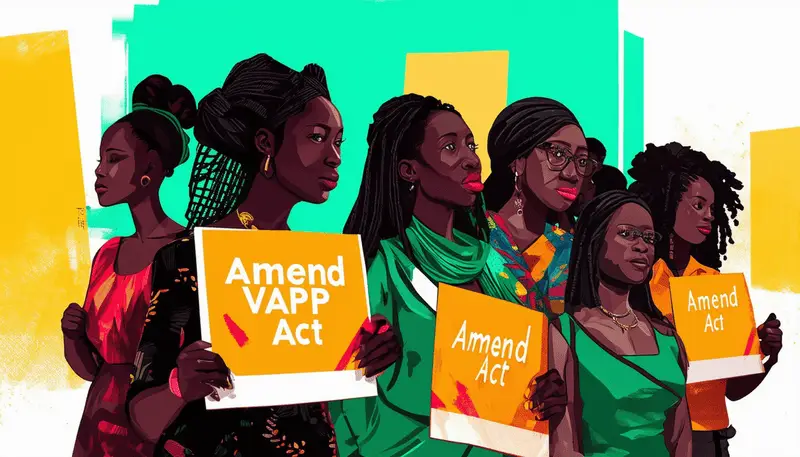Durga Nandini, Co-Founder, Nguvu Collective
A critical piece of legislation in Nigeria, which has been lauded as a pioneering and gender-neutral Law that protects people from abuse, has been staring at an uncertain future. A Bill introduced by Senator Jibrin Isah of Kogi-East Senatorial District at the Nigerian Senate seeking to Repeal the Violence Against (Prosecuted) Persons Act 2015 and replace it with another “more robust” piece of legislation has been stirring up a storm.
While the Senator’s intentions might seem well-meaning – he argues for more holistic reforms on the Act for effective dispensation of justice – his approach raises serious concerns. His Bill to Repeal the VAPP could potentially set back the progress Nigeria has made in establishing wide-reaching systemic changes towards addressing violence against vulnerable persons.
Nguvu Change Leader Priye Diri has launched an online campaign addressed to Senator Jibrin Isah urging him to reconsider his Bill to Repeal and strongly urged him to propose an Amendment instead. Several women’s rights organisations have supported her campaign, which is an evidence of the national sentiment on the ongoing attempts to repeal the VAPP Act.
Let’s explore the VAPP Act’s current form, its existential challenges and what Repealing it would mean for Nigeria’s progress.
Behind every Law that seeks to protect the vulnerable, is the sweat and blood of hundreds of citizen activists and civil society organisations who fought for that Law to become a reality. Those voices are almost always invisible. In 2015, the Violence Against (Prosecuted) Persons Act (VAPP) became a reality after a decade of relentless advocacy and a strong people’s movement demanding a Law. The patience, persistence and perseverance of these activists are unparalleled.
Repealing the Act will undo years of precious efforts of grassroots activists who were instrumental in working with the Government to make this Act a reality.
The VAPP Act’s wide spectrum of gender inclusive justice measures has been acknowledged as pathbreaking. The VAPP Act is the first gender-neutral law in Nigeria that recognised men as victims of rape. It is the only Law in Nigeria that criminalizes Female Genital Mutilation (FGM), a culturally accepted form of violence against girl children. It broadened the definition of rape to include penetration beyond a penis with other parts of the body and by objects. It also broadened the definition of violence and abuse beyond sexual violence to include domestic and psychological abuse.
It is the only GBV-focused legislation that provides for compensation of victims by offenders.
Rhoda Tyoden, the former President of the International Federation of Women Lawyers (FIDA), Nigeria, has been quoted saying that the VAPP Act “covers almost everything that somebody will want to start removing.”
It is ironic that Nigeria is currently deliberating removing not just sections but the VAPP Act in entirety.
Significant strides have been made in the domestication of the Act, 34 out of 36 states in Nigeria have adopted the VAPP Act to enable a nationally coordinated implementation strategy against gender-based violence (GBV) and to build standard services across the nation, to respond to individuals, families and communities affected by violence.
A plethora of challenges have come in the way of effective implementation of the Act, some of which include
Some of the of the major drawbacks of the VAPP Act include its jurisdictional limitation to the Federal Capital Territory and slow dispensation of justice by the Judiciary. A critical analysis study of the VAPP Act in October 2023 recommended an amendment of the Act to vest jurisdiction on the Federal High Court in line with Section 251 of the Constitution and domestication by States.
Can these challenges be overcome with smart gender budgeting and amendments in addressing the systemic issues in effective implementation? Or does it need a full Repeal of the Act, potentially stripping survivors of their only legal redressal mechanism? The verdict is for anyone to see.
Nigeria’s global status on GBV
According to the UNFPA,
Despite its inherent challenges, the VAPP Act, since its inception, has provided survivors of GBV with legal cause to seek redress and has, so far, emboldened several thousand women to report their cases in pursuit of justice, a significant shift from the past.
Repealing the VAPP Act would be a devastating setback in the fight against gender-based violence in Nigeria. It would strip away critical protections that have been instrumental in reducing violence and supporting survivors. The gains made across Nigeria in combating GBV would be undone, leaving women and vulnerable individuals without the legal safeguards they need.
Bio: Durga Nandini is the Co-Founder and Chief Advisor at Nguvu Collective. She is an award-winning journalist and campaigns and communications expert who writes on gender rights issues.



